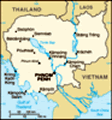Advertisement
Published: November 10th 2008
In an effort to promote a cohesiveness of cultures and allow teacher trainees to formulate a regional network (but really, to save time and money), LanguageCorps takes members signed up to teach in Asia and throws them all together into a stuffed little classroom in Phnom Penh, Cambodia for two weeks of…(thunder clap) Teacher Training!
Classes were held at a university just a few blocks from the Okay Guesthouse. Despite the overly large blue sign affixed to the roof, I don’t believe that I once, in two weeks, correctly pronounced the name of this place; the closest I came was probably “Pannier Strap University”. Paññâsâsta University specializes in teaching English and is a common place of employment for those who remain in Cambodia to teach after graduating the course. It is heaving with throngs of students, some there to learn on their own interests, others their parents’. However, because many of the teachers at the university are foreign, it was one of the few places we could hang out around a large number of locals and not feel like a museum exhibit.
We had a fairly large class, 17 LanguageCorps members plus Rick, the course instructor. Rick is from
the Midwest and moved to Thailand as a young adult to work with refugees who did not speak English; it was there he saw the potential of marketing English language programs to a.) create more opportunities for local people in global communications and b.) support an exuberant lifestyle for himself overseas. The fact that he is close to 60 and has a daughter who just turned four suggests that he is indeed still on top of his game. With reference to the group picture, left to right, here is our class: Steve (Ireland), Mark (Washington), Rick, Josh (Pennsylvania), Greg (Australia), Azalea (New York), John (New Jersey), Tricia (California), Chris (Illinois), Patricia (Italy), Eva (Czech), Ryoko (Japan), Laurel (Ohio), Evelyn (Slovakia), Chris (Indiana), myself, Ben (Australia), and Johnny (Italy).
The classes were held from 9 to 5 with a 90-minute lunch break to split the time. Generally, classes would fall into one of the following categories: methods in teaching with consideration to culture, studies in grammar, word structure, and phonemics, learning the specific steps to one of LanguageCorps’ techniques in teaching English, or, in the afternoons, demonstrating the technique learned in front of the class using other members as students
(known as “Peer Teach” or, more commonly, “Plan-it-five-minutes-before-class Teach”). Classes varied in their novelty; some we found fresh and exciting, others as stale as a week-old Triscuit. That said, much of teaching English is learning how to motivate and make interesting - I felt this was something in which Rick excelled. There was an engagement about his knowledge and passion of the culture mixed with a subtle cruel wit that could turn even a walkthrough of adverbial dependent clauses into a memorable affair. You could say that I really enjoyed having Rick as a teacher. You could also say that I really wished Rick taught the afternoons as well as the mornings. Because in the afternoons we had Steve.
Steve is short, stout, and very Irish (NOTE: Don’t be confused, Steve is not in the class picture above. That is another Steve, also Irish. They both have less than what most would consider a full head of hair. They also both have thick accents. Actually, as far as I know they might have been the same person). Steve teaches English classes at the university and goes about his job with a level of enthusiasm usually reserved for a visit
to the proctologist. It might have been that the tourist bars were all out of people to fight with, or perhaps somebody stole his pot of gold, but whatever the reason, Steve comes in just behind
this office worker as the most ticked-off-for-no-apparent-reason guy I’ve ever seen. And at no one in particular - just the world in general and anyone who may cross his path that day and further delay his inevitable after-work jaunt to the brothel. Steve was put in charge of evaluating our performances as teachers in training and as he sat there, filling out the scoring rubric before we had even started, you could feel his disdain for us dripping off his shiny head, thick as porridge. I doubt I was alone in my reasoning that if a person like Steve can keep a job teaching English here for two years, I think I’m going to be alright.
Paññâsâsta University is five or six stories high and has an open-air roof that is split into two halves: a sizable area in the sun to walk around and a shaded space to sit and eat. We would almost always walk somewhere off campus for lunch, Cup Café and
Okay Guesthouse Restaurant were two favorites, but for the shorter 15 minute breaks between classes we would typically head to the roof for a bite to eat. A little store is managed that sells water, iced tea, paper-thin sandwiches, and, most importantly, hefty donuts. Some of us became dependent on two or three of these sugar-bombs just to make it through one day of classes and needless to say, I’m sure the store owners was quite melancholy to see us and our wads of loose Riel depart after two weeks. Chris made the invaluable purchase of a wicker handball-sized ball the likes of which are extremely popular among virtually all boys in Phnom Penh; we learned the local name for it and it is now escaping me. Anyway, small breaks in between classes allowed time for us to head up to the roof with the ball and put our juggling skills (or severe lack of) on display. Many of the students who were also on break would stand in groups and stare, occasionally clapping when Chris pulled a nifty move but more often laughing when I would manage to propel the ball in the wrong direction or, in one instance,
launch it off the roof and down into the parking lot below.
The method of teaching that Rick emphasizes uses dialogue as a vehicle. Every Peer Teach session that we had essentially used the same 6-8 line dialogue but crafted it in different ways to stimulate different points of student learning. For example, a dialogue might be used one time to introduce new words and then used again later to expand vocabulary by inserting different words where the new words once were. One could record a tape of the dialogue and use it as a listening exercise or perhaps ask the students to recall certain details from the script as part of a writing activity. The logic behind rehashing information in this manner suggests that it takes 7-12 “unique experiences” of a non-English speaker speaking a particular word or phrase before it develops permanence. This makes some sense to me and although many of us found it maddening to work with the same 6 lines of simpleton-speak for two weeks, I think that it may just be part of being an English teacher that they hastily forget to mention in the brochure.
Our Peer Teach sessions were a
lot of fun but also provided a challenge, mostly in the sense that running dialogues, activities, and games centered on learning English didn’t really provide authentic teacher practice since the group was, of course, English-fluent to begin with. That said, they did set the scene for some high comedy, especially on days that dragged on and on until the point (the “manic hour”) at which all care for the class was lost and everything became one big joke. Perhaps the most memorable manic hour moment happened on what is now referred to as Not-So-Good Friday, the post-boat, pre-bus morning class that could best be described in two words: still drunk. Some heads dangled limply from stooped shoulders, others found refuge on a cool desktop or in folded arms, anything to stop the spinning. The room was dead and half of us were wishing for the same when there came a faint, low tremor. It sounded like a faraway ship announcing its arrival. The noise grew and we suddenly realized it was a voice. Someone in the room was singing. In Italian. Then, without warning, Johnny rose from his seat and purposefully strode to the center of the class bursting into
full-fledged song with the most fantastically loud, operatic timbre and accompanying Pavarottian hand gestures one could imagine. The entire routine was more Italian than a spaghetti-stained Ferrari and lasted for a good minute or so during which not one person said a word. Nobody laughed or snickered. Nobody started shuffling papers or twiddling thumbs. We all just stared and listened in amazement. It was reminiscent of the famous scene in
Shawshank Redemption when
Andy plays the record over the PA and all the prisoners stop what they’re doing and look up at the sky, glassy eyed; I can almost hear Morgan Freeman voicing over Johnny's performance - “I have no idea to this day what that Italian man was singing about…” In many ways, Johnny was our Andy - he stood for what he believed in and in doing so, freed us from the monotony and listlessness that came to shape much of teacher training. As it turns out, Italians are good for something other than wine after all. Magnifico, Johnny!
Advertisement
Tot: 0.119s; Tpl: 0.013s; cc: 7; qc: 24; dbt: 0.0873s; 1; m:domysql w:travelblog (10.17.0.13); sld: 1;
; mem: 1.1mb

















patrizia
non-member comment
Italians look confused......
Hi,Thom,thanks for making us so famous !!!!! ah,ah,ah!!!! Really enjoyed reading your story,it's great!!! take care and keep in touch!!!!